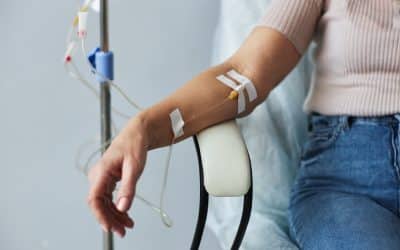What is TMS?
TMS, transmagnetic cranial stimulation, is a type of non-invasive brain stimulation therapy which uses electromagnetic pulses to stimulate nerve cells. This can improve symptoms of mental health disorders, such as depression, anxiety, OCD and PTSD. The procedure may even improve motor dysfunction, making it potentially helpful for Parkinson’s disease, multiple sclerosis, or stroke rehabilitation.
TMS for depression
The standard treatments for depression, medications and psychotherapy, are often not effective. Approximately one third of patients with depression do not respond to these treatments. TMS is generally recommended for patients with treatment resistant depression.
TMS can help by stimulating nerve cells and increasing activity in the prefrontal cortex, where low levels are often associated with depression.
How does TMS work?
An electromagnet painlessly delivers a magnetic pulse that stimulates nerve cells in a certain region of the prefrontal cortex, the part of the brain involved in mood control. The TMS machine generates highly concentrated magnetic fields which turn on and off very rapidly. These magnetic fields are very similar to those produced by an MRI machine.
The magnetic fields do not directly affect the whole brain; they only reach about 2-3 centimetres into the brain directly beneath the treatment coil. In the brain, the magnetic fields produce very small electrical currents. This activates cells within the brain which release neurotransmitters such as serotonin, norepinephrine and dopamine.
Depression is thought to be the result of an imbalance of these chemicals in the brain, so TMS can relieve depression by restoring the chemical balance.
What does the treatment involve?
Before the treatment, your doctor will measure your head to determine where to place the magnetic coil and to personalise the settings on the TMS machine. Your doctor will also determine your motor threshold, the amount of magnetic energy needed. During the course of treatment, the amount of stimulation can be changed, depending on your symptoms and side effects.
During the treatment, you’ll hear a clicking sound as the magnetic impulses are released. You will also feel a tapping or knocking sensation beneath the magnetic coil. The treatment can last from 30 to 60 minutes. After the procedure, you can drive yourself home and resume normal activities.
TMS side effects are uncommon but may include mild headaches, light headedness, sleepiness and scalp/ neck pain. These usually go away after several treatments.
Treatment plans vary depending on your response and specific conditions but may involve treatment five times a week for about four to six weeks.
If TMS works for you, your depression symptoms may improve or go away completely. After completion of a TMS treatment series, standard care for depression, such as medication and psychotherapy, may be recommended as ongoing treatment.
Who should use TMS treatment?
If you have depression, your doctor will likely recommend antidepressant medication and psychotherapy before TMS. However, TMS may be suited to you if:
- you have used one or more antidepressants without results
- you have experienced negative side effects from antidepressants
- you are a child or teenager
Younger people are more prone to developing adverse side effects from antidepressants, meaning TMS could be an ideal choice.
Please contact us to find out more about this service.




